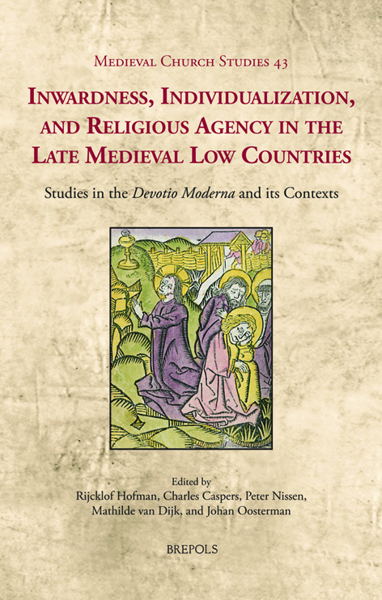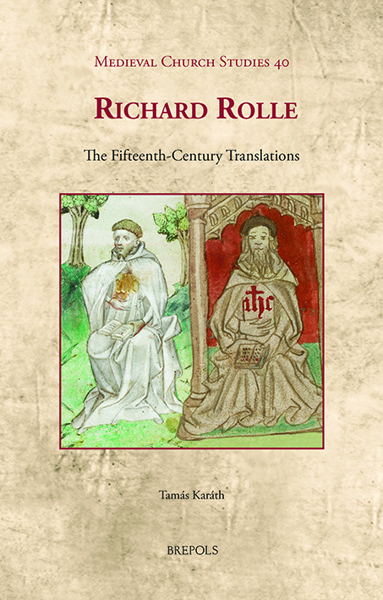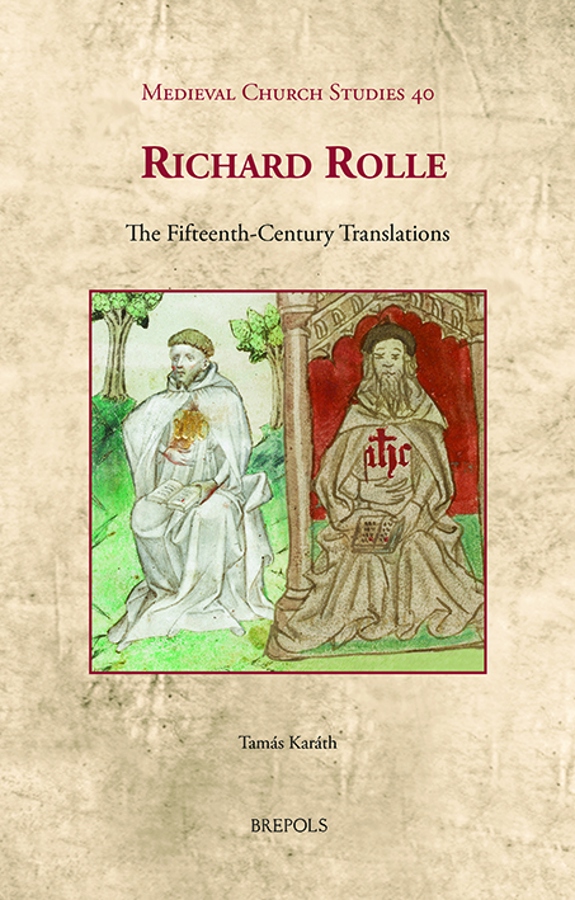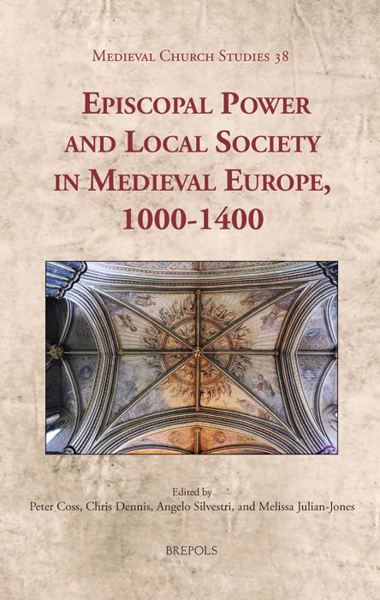
- Pages: xii + 370 p.
- Size:156 x 234 mm
- Illustrations:9 b/w, 6 tables b/w.
- Language(s):English, Middle English, Latin
- Publication Year:2018
- € 110,00 EXCL. VAT RETAIL PRICE
- ISBN: 978-2-503-57769-2
- Hardback
- Available
- € 110,00 EXCL. VAT RETAIL PRICE
- ISBN: 978-2-503-57770-8
- E-book
- Available
The volume pursues the restoration of Richard Rolle's contested authority by the mystic's 15th-century translators.
"(...) this is a well-grounded study and often fascinating study. It will be of use to scholars of English mysticism, Middle English translation, English religious history, and Richard Rolle." (Holly Johnson, in Sehepunkte, 11, 2019)
“This well-informed and welcome book by Tamás Karáth, of the Pázmány PéterCatholic University in Hungary, is a testimony to the current international renaissance of interest in Richard Rolle (d. 1349).”(Alastair Minnis, in Medium Ævum, 88/2, 2019, p. 420)
“The scope of the work is ambitious, but Karáth manages to attain his objectives.” (Kinga Lis, in Journal of British Studies, 59/3, 2020, p. 651)
“Karáth's monograph is the most comprehensive treatment of the late-medieval translations of Rolle to date. It makes an important contribution to our knowledge of Rolle's continued significance in the fifteenth century (…) This volume provides a thorough examination of the work of Rolle's translator-editors and is grounded in a generous enumeration of evidence in the appendices (…) This thorough analysis makes an important and welcome contribution to Rolle studies, particularly for those interested in the making of Rolle as an author in late-medieval England. It also offers significant insights for the study of late-medieval authorship and translation more generally. Karáth's monograph shows that corpus analysis and manuscript source study continue to be fruitful and essential activities in each of these areas.” (Michael Van Dussen, in The Medieval Review, 20.08.38)
This book explores the fifteenth-century translations of Richard Rolle’s Latin and English writings into English and Latin, respectively, raising questions about the impact of translation on an author’s legacy through the editorial activity of his translators. The volume also discusses Rolle’s sensory mysticism — which was criticized by the ensuing generation of mystics — whilst looking into the ways in which translations of his work create a fifteenth-century version of Rolle. While the fifteenth-century translations did not represent the standard means of shaping Rolle’s authority, this study illustrates individual encounters with Rolle’s writings in which interpretation was much more overt than in the devotional reuse of untranslated Rollean material. The volume asks if alternative and perhaps controversial portraits of the same author arise from the translations.
Richard Rolle has received many, often conflicting, labels in scholarship: the father of English prose, the first medieval English author, the first known mystic of English literature, the runaway Oxford man, the non-conformist hermit, and the misogynist. This book is located in the context of the late medieval censorship culture which inevitably impacted the translators’ treatment of authority, revelatory writing, and theological speculations. The analysis of Rolle in translation highlights the various meanings, practices, and implications of translation in the fifteenth century.
Acknowledgements
List of Illustrations
Abbreviations
Introduction
Chapter 1: Rolle in Hindsight: Legacy and Translations
- Richard Rolle and his Mystical Experience
- Fourteenth-Century Criticism of Rolle’s Mysticism
- Rolle and/in Translation
- The Latin Ego dormio: Text, Manuscripts, and Translation
- Author/Speaker and Addressee in the Latin Ego dormio
- Rolle’s Ego dormio in the Cloister
- The Latin Ego dormio and Universal Salvation
- An Afterthought: The Latin Translation of The Form of Living
- Richard Misyn: Hermit and Prelate
- The Manuscripts of Misyn’s Fire of Love
- Misyn as Translator
- Misyn as Editor
- Misyn’s Purpose of Text
- Readers and Uses of the English Versions of the Emendatio on the Basis of Manuscript Evidence
- Hiding Translators: Characteristics of the Textual Strategies
- Theological Speculations in the English Translations of the Emendatio
- The Taming of Rolle: Overwriting Affects in the Translations
Appendix I: Additions in Misyn’s Translation of Incendium Amoris
Appendix II: Omissions in Misyn’s Translation of Incendium Amoris
Appendix III: Different Meanings and Errors in Misyn’s Translation of Incendium Amoris
Appendix IV: Translations of Rolle’s Key Terms Related to Calor in Misyn’s Incendium amoris
Appendix V: Misyn’s Translation of Rolle’s Emendatio vite
- Calor, Canor, and the Bodily Responses to Emotional Fervour
- Calor
- Canor
- Bodily Responses to Fervour (Tears, Weeping and Sighing)
- Omissions
- Additions
- Mistranslations and confusions in the translation
- Original Doublets and Other Additions
Index




